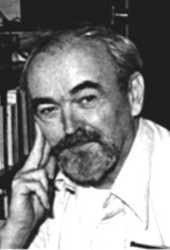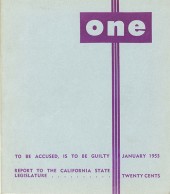
Pioneer Gay Journalist-Historian
Jim Kepner
Dies at 74
by Ernie Potvin
Nov. 17, 1997
PRESS RELEASE
Jim Kepner, a pioneer Gay activist, journalist, historian and founder of the International Gay and Lesbian Archives, died at Midway Hospital in Los Angeles on November 15, 1997 after an intestinal operation.
Kepner was a monumental icon of dignity and respect in the Gay and Lesbian community for more than 50 years. His attributed birth is January, 1923. He was an abandoned baby believed to be eight months old when found, wrapped in newspapers, on September 19, 1923 in Galveston, Texas. A prize-winning bible student at age 12, he announced plans to be a missionary in Africa when interviewed by a young newspaper cub, Walter Cronkite. By the time he graduated cum laude from Galveston’s Ball High School in 1940, he was already questioning his beliefs.
With the outbreak of WWII, he migrated to San Francisco where he began exploring his youthful feeling of attraction to men, and started connecting to that city’s homosexual sub-culture. An avid reader and bibliophile at age 19, he explored the Public Libraries for every bit of information he could find on same-sex love. Finding very little, he began searching used bookstores in what would become his life’s mission to uncover, preserve and disseminate the true history of Lesbian and Gay people. His first discovery was the 1928 Lesbian novel The Well of Loneliness, which started his library collection that would eventually grow to become the International Gay and Lesbian Archives with tens of thousands of volumes, the largest library of its kind in the world.
Prompted by feelings of being out of place in society, Jim Kepner emersed [sic] himself in science fiction, and in 1943–45 he edited his first publication, Toward Tomorrow, a sci-fi fan magazine. Kepner worked at a ship yard during the war and was concerned about multiple social inequities.
In his own words, Jim said his religious ideals and sympathies with workers and Blacks led him to pacifism and atheism. At war’s end he had joined the Communist Party and got his training as a film reviewer for the San Francisco People’s World, and as a journalist writing a column for the Party’s New York Daily Worker in 1947. Two years later he had a rough hitch-hike back to San Francisco after being expelled from the Communist Party when it became known he was homosexual.

Around 1952, Jim Kepner moved to Los Angeles. He had been there for a short period earlier. There he found a small group who, in 1950, had organized the Mattachine Society, America’s first successful Gay Rights organization. In 1953 Kepner became a staff writer for the nation’s first publicly declared homophile publication, ONE magazine, launched in January of that year by several Mattachine members. This began Kepner’s career as a pioneer Gay journalist, in which he wrote over 2,000 articles and news reports in many publications of the Gay press, including The Advocate. A collection of his early writings is being published next month in the form of a book, Rough News, Daring Views: Pioneer Gay Journalism (Haworth Press, 1997).
In August of 1954, the United States post Office confiscated an issue of ONE Magazine declaring it “obscene,” and refusing to allow it to be sent to subscribers through the mails. Kepner and other staff members sued the Post Office, and in 1958 the United States Supreme Court ruled in favor of ONE, deciding that a serious publication cannot be censored just because it discusses homosexuality as a social issue. This decision gave the Gay rights movement it’s first significant legal victory, and provided the basis for and important expansion of First Amendment guarantees of Freedom of the Press for all Americans.
In 1956 Jim Kepner was a co-founder of ONE Institute, an educational institution to help homosexuals overcome the negative self-image perpetuated in American society. In ONE’s L.A. headquarters, they taught the first classes in what would later become known as Gay and Lesbian Studies, covering history, anthropology, sociology, psychology, philosophy, religion and political science from a Gay perspective, long before anyone else in America would think to do such a thing. Jim continued to teach classes, including at the UCLA Experimental College in 1974-75. He gave numerous lectures on Gay history in many states.
In 1958 Kepner founded and served as first editor of ONE Institute Quarterly of Homophile Studies, the first English-language scholarly journal on homosexuality. He withdrew from the publication from 1961–63 to enroll at Los Angeles City College where he studied Philosophy, History, and Arabic.
Kepner became involved in the radical activism of the 1960s, marching in protests for the empowerment of African-Americans, women, and the peace movement. At the time he supported himself as a taxi driver, which allowed him the flexibility to do his activist work. He was a prime mover in PRIDE, Los Angeles’ first Lesbian and Gay street militant organization, and became an officer of the Southern California Council on Religion and the Homophile.
Kepner often wrote about the fat-breaking news of Gay Liberation for several Gay magazines in the late 1960’s and early ’70s, including investing his savings to launch his own Gay publication Pursuit & Symposium. He was more than a reporter, however: He was a chronicler of the times and an insightful voice of the burgeoning Gay and Lesbian community.
Jim Kepner was a prime activist, centrally involved in establishing L.A.’s Gay pride organization, Christopher Street West, following the 1969 Stonewall uprising in New York. CSW has staged L.A.’s Lesbian and Gay pride parades every year since. In 1979 he was a co-founder of the Los Angeles Gay and Lesbian Community Services Center at Wilshire Blvd. and Union Street, and years later was a co-founder of the community’s Celebration Theatre.
In 1979 Kepner helped organized Southern California participation in the first March on Washington for Lesbian and Gay Rights, a task he repeated for the 1987 second March on Washington.
Through all this time, Kepner continued to collect and preserve every item of information he could find about Lesbians, Gay men, Bisexuals, and Transgendered persons. Every day, for nearly half a century, he scoured newspapers and clipped any article which mentioned homosexuality. His collection grew so much that he eventually ran out of space in his house. He was becoming well known as a historian of the Gay and Lesbian movement, and researchers often visited him to gain the benefit of his encyclopedic knowledge and to locate information which was not being saved in public libraries. With this response, in 1979 Kepner incorporated his collection as the National Gay Archives. As it further expanded to include a board of directors, it changed name to become the International Gay and Lesbian Archives.
By the 1980s, Kepner’s reputation was spreading far and wide. In 1982, Los Angeles Mayor Tom Bradley appointed Kepner to the city’s Bicentennial Organizing Committee. He was honoured as “Man of the Year” by Christopher Street West and received other recognition for his work from the city councils of West Hollywood and Los Angeles, and many organizations around the world.
Nevertheless, the continuing day-to-day work of the Archives was becoming more taxing as Kepner and a group of dedicated volunteers struggled to keep the library abreast with all the information that was now being published about homosexuality. More academic researchers came from around the world, as well as journalists, movie producers, lawyers, students and others, who needed to use its diverse sources. As more books, periodicals, and file cabinets accumulated, the Archives outgrew first its rented storefront space in Hollywood, and later a space donated by the City of West Hollywood.
In 1994, Kepner’s Archives and ONE, Inc. merged, bringing Kepner’s two major legacies together. The University of Southern California then made an offer to provide a building (now under renovation) to house this valuable collection. Kepner lived most of the last three years of his life at the USC Center for Scholars in Residence, where he enjoyed daily interaction with researchers from around the world. Although he did not live to see the archives building at USC completed, Kepner remained an active member of the board of directors of ONE, Institute-International Gay and Lesbian Archives [ONE/IGLA] until his death.
In September he was honored at the Annual Ball of ONE Institute, by hundreds of grateful readers and writers who crowded into the El Rey Theater for the commemorative program. Two days before he died, Kepner was working on several books as well as planning seminars and classes. In honor of the lifetime dedication of Jim Kepner, the board of Directors of ONE Institute voted to name the collection after him.
Jim Kepner is survived by his longtime close friends in ONE Institute, especially John O’Brien, Ernie Potvin, Rev. Flo Fleischman, Jim Schneider, Dr. Walter Williams, Fred Frisbie, Harry Hay, Pete Nicholas, Eldon Murray, Randy Wicker, Allen Leopold, and a wide circle of friends in many states.
Instead of a funeral, a memorial will be held by ONE Institute in early 1998 to commemorate Jim Kepner’s life and to celebrate five decades of the Gay and Lesbian Rights Movement.
Everyone who has been touched by Jim Kepner’s life or supports the Gay/Lesbian movement around the world is encouraged to come.
In lieu of flower, donations are being accepted to help operate the library Kepner founded. For information call 310-854-02xx.
For Press inquiries contact Ernie Potvin at (805) 526-82xx
or E-Mail: Uncernie@aol.cxx


